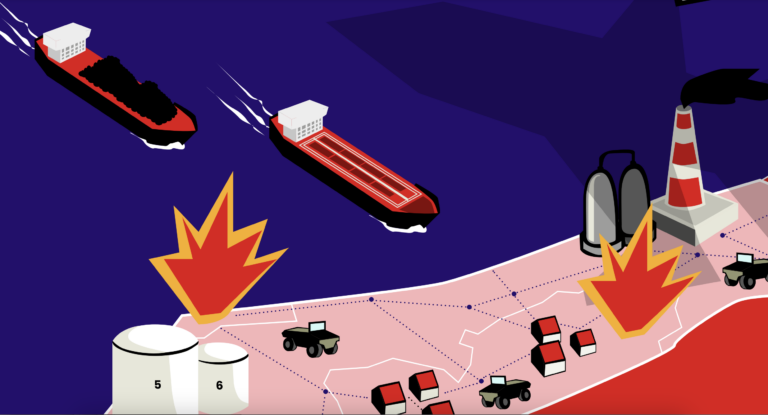
Making a Killing?
State and corporate commercial ties to genocide in Gaza – and what governments and companies must do to prevent it
Israel is against Palestinians in the Gaza Strip. This briefer examines the legal consequences of this order for companies and third states, with regard to businesses domiciled in their territory and to their own trade and economic relations.
Following a case brought by South Africa against Israel, the International Court of Justice (ICJ) determined that there is a plausible risk of Israel committing genocide against the Palestinians in Gaza. Due to a “real and imminent risk” of genocide, the court found that in the case concerning the Application of the Convention on the Prevention and Punishment of the Crime of Genocide in the Gaza Strip ( ), urgent measures must be taken to prevent genocide. Therefore, on 26 January 2024, Israel to “take all measures within its power” to prevent genocide and incitement to genocide against the Palestinians in Gaza. In its second order from 28 March 2024, more specific measures Israel should take to ensure the provision of basic services and humanitarian assistance and that its military does not commit genocide.
The implications of this order are clear for Israel, but what are the implications for multinational companies with commercial ties to Israel and for the countries in which those companies are headquartered?
Genocide convention – Article II:
“In the present Convention, genocide means any of the following acts committed with intent to destroy, in whole or in part, a national, ethnical, racial or religious group, as such:
- (a) Killing members of the group;
- (b) Causing serious bodily or mental harm to members of the group;
- (c) Deliberately inflicting on the group conditions of life calculated to bring about its physical destruction in whole or in part;
- (d) Imposing measures intended to prevent births within the group;
- (e) Forcibly transferring children of the group to another group.”
NB: In its case before the ICJ, South Africa alleges that Israel commits acts a-d.
Article 1 of the Genocide Convention places a duty on all state parties to “undertake to prevent and punish” the crime of genocide, and to “employ all means reasonably available to them, so as to prevent genocide so far as possible.” But what does that mean in practice?
As stated in the judgement(opens in new window) on the Bosnia and Herzegovina v. Serbia and Montenegro case, a key factor in determining what a state must do is its “capacity to influence effectively the actions of persons likely to commit, or already committing genocide.” The strength or depth of the various links a third state has to Israel helps to determine its capacity in this regard. It does not matter whether the third state can actually prevent the commission of genocide – it is obligated to try. Article 1 is thus an obligation of effort, not of result.
In Bosnia and Herzegovina v. Serbia and Montenegro, the ICJ determined(opens in new window) that this obligation to prevent genocide arises “at the instant that the State learns of, or should normally have learned of, the existence of a serious risk that genocide will be committed.” In relation to the current situation in the Gaza Strip, per the ICJ’s order of 26 January 2024, thereby activating the duty on third states to take preventative action. Before that, warnings of the risk of genocide being perpetrated against Palestinians in Gaza had already been made by United Nations experts(opens in new window) , human rights organisations(opens in new window) , and .
How can third states prevent genocide vis-à-vis companies domiciled in their territory and in their trade and economic relations?
Home states
To comply with Article 1 of the Genocide Convention, states must take effective action to prevent companies domiciled in their jurisdiction from becoming involved in acts of genocide in Gaza and sanction them if they do so. Below are examples of how companies currently risk becoming involved in genocide.
In its Principle 7, The United Nations Guiding Principles on Business and Human Rights (UNGPs) provide some further guidance on how a home state – the country in which a company is domiciled – can fulfil this duty. Home states should engage “at the earliest possible stage possible” with companies to help in the identification and prevention of the risk of their activities or business relationships being linked to acts of genocide in Gaza. Additionally, states should deny access to public support and services to companies that are linked to acts of genocide in Gaza and refuse to cooperate in addressing the situation. Finally, home states should ensure that their “policies, legislation, regulations and enforcement measures are effective in addressing the risk of business involvement” in genocide in Gaza. This means, among other things, that states should take effective action to investigate and prosecute companies (where national laws allow) and corporate officials for their involvement in acts of genocide in Gaza.
States as economic actors
Where states engage in commercial activities, for example, through public procurement, as shareholders, or through public pension fund investments, with actors potentially implicated in acts of genocide in the Gaza Strip, this creates another opportunity for preventive measures. States can terminate such contracts. For example, many states worldwide procure military technology and hardware/weapons systems from Israeli defence contractor Elbit Systems. According to the Business and Human Rights Resource Centre(opens in new window) , Elbit is the primary provider of land-based military equipment and unmanned aerial vehicles to the Israeli forces. Since 2007, human rights advocates have called(opens in new window) on states to suspend contracts with Elbit Systems and divest public funds from the company.
Trading partners
The capacity of a state to “influence effectively” Israel’s actions in Gaza is in part by the depth of its economic ties to Israel. In trade relations, states provide the legal and institutional frameworks for economic cooperation with other states. States that have trade relations with Israel must view these relations as a means reasonably available to prevent genocide.
According to trade facts & figures published by the European Commission(opens in new window) , the EU is Israel’s biggest trade partner in terms of value, with a two-way flow of goods, services and foreign direct investments. In 2022, 31.9% of Israel’s imports of goods came from Europe, while 25.6% of Israel’s exports of goods were destined for the EU, in total amounting to €46.8 billion. Two-way trade in services amounted to €16.7 billion in 2021. In 2022, Israel and the United States traded(opens in new window) €35.6 billion worth of goods. These are powerful ties that can be effectively leveraged to influence Israel’s conduct in Gaza.
Economic sanctions, including trade embargoes, are key tools for States to influence the behaviour of other states. Where states have significant commercial ties, these measures can be powerful enough to pressure trading partners to change behaviour in other situations. For example, in response to Russia’s crimes in Ukraine, the EU has since March 2014 progressively imposed sanctions(opens in new window) on Russia “designed to weaken Russia’s economic base, depriving it of critical technologies and markets and significantly curtailing its ability to wage war.” Sanctions have targeted entities including banks, insurance companies and financial institutions, companies in the military and defence sector, companies in the aviation, shipbuilding, mining, and machine building sectors, telecom companies, IT companies, media organisations responsible for propaganda and disinformation, and the Wagner Group (a Russia-based private military entity with ties to the Kremlin). The EU also adopted sanctions(opens in new window) against Iran in relation to the manufacturing and supplying of drones to Russia.
Additionally, nearly all ( ) of Israel’s imported weapons come from the United States and Germany. Court cases have been undertaken in the United Kingdom, the Netherlands, the United States, Denmark, and Germany intended to stop/prevent arms exports to Israel amidst warnings of genocide.
The UN Special Rapporteur on the occupied Palestinian territories, Francesca Albanese, has called(opens in new window) on the EU to suspend its economic association agreement with Israel immediately. The UN Human Rights Council adopted a resolution(opens in new window) in March 2024 calling upon states to impose a three-way arms embargo, ceasing the “sale, transfer and diversion of arms, munitions and other military equipment to Israel.” It also calls upon states to refrain from “the export, sale or transfer of surveillance goods and technologies and less-lethal weapons, including ‘dual-use’ items” where there’s reason to suspect their use in human rights abuses in light of “the order of the International Court of Justice of 26 January 2024, determining that there is a plausible risk of genocide in Gaza.” Similarly, UN experts and human rights organisations are for an arms embargo and (economic) sanctions to be imposed on Israel as a way to prevent genocide.
How might corporations be liable for complicity in genocide?
While they are not a party to the Genocide Convention or to other international legal instruments, corporations and their employees can be held liable for their contribution to acts of genocide, as well as war crimes and crimes against humanity. Article VI of the Genocide Convention specifies that “persons” may be held liable for genocidal acts, which as including legal persons such as corporations, and certainly individuals in their capacity as employees. Corporate managers and employees by the International Criminal Court under the Rome Statute, and corporations in national courts under laws transposing principles of the Genocide Convention into national legal systems or by direct reference to the Convention itself.
Corporate complicity in genocidal acts perpetrated by others is most often captured in an ‘aiding’ and/or an ‘abetting’ relationship, where aiding refers to the provision of physical or material support to a party committing a crime, and abetting refers to encouragement. An aiding or abetting relationship whether or not a corporation or its employees are physically present, and it may come to exist before, during, or after the act(s) of genocide in question. Aiding and/or abetting also of their counterpart’s intent to commit genocide and that the support/encouragement has a substantial effect(opens in new window) on the commission of the crime of genocide.
Which type of companies may be complicit in genocide in Gaza?
Companies supplying various types of goods and services may be complicit in the crime of genocide against the Palestinians in the Gaza Strip, including:
Military supplies, including fuel
Weapons, ammunition, vehicles, and fuel (military or dual-use) form an essential supply chain for the activities of the Israeli air force, ground forces, and navy to besiege and attack Palestinians, critical infrastructure, agricultural land, and persons and facilities with special protective status under international humanitarian law across the Gaza Strip. According to Oil Change International(opens in new window) , major oil companies, including BP, Chevron, ExxonMobil, Shell, Eni, and TotalEnergies, are – either through their ownership stakes or operations – involved in supplying Israel with fuel.
Information technology (IT)
The Israeli military uses(opens in new window) IT systems to identify targets for military attacks and has been carrying out near-automated bombing campaigns in densely populated areas, with minimal human involvement in decision-making of the targeting. One system, referred to by Israeli intelligence officials as the Gospel(opens in new window) , “marks buildings and structures that the army claims militants operate from” and is used in the large scale targeting of civilian buildings. A second system, called Lavender(opens in new window) , identifies people to be put on a “kill list” and has played a central role in the widespread killing of civilians.
Mass surveillance and facial recognition(opens in new window) have been applied in Gaza by the Israeli military “cataloging the faces of Palestinians without their knowledge or consent, according to Israeli intelligence officers, military officials and soldiers.” The New York Times has reported that technology provided by Israeli company Corsight is run by Israel’s military (cyber-) intelligence unit 8200, which was tasked with creating a “hit list.” American data analytics company Palantir Technologies, specialised in defence and intelligence services, has also that it provides services to the Israeli Ministry of Defence to support “war-related missions.” Palantir’s CEO has stated(opens in new window) that the company’s services are responsible for “most of the targeting” in the war in Ukraine, and Time Magazine has reported(opens in new window) that such services can identify a military target and prompt an attack within three minutes – it is plausible that similar technology is being used by Israeli armed forces in Gaza.
Additionally, it cannot be ruled out that AI and cloud computing services provided to the Israeli government by Amazon and Google are being used by the Israeli military(opens in new window) in its conduct, including the potential commission of genocidal acts. Time Magazine found(opens in new window) that Google has provided services to the Israeli Ministry of Defence as of 27 March 2024, and according to the companies’ , such services are capable of being used for surveillance and military target identification.
Social media
, popular social media platforms such as TikTok, Instagram, X, Facebook, WhatsApp and Telegram are being used by Israeli civilians and military personnel alike to spread content which could plausibly be viewed as incitement to genocide, including genocidal rhetoric, dehumanisation speech, and incitement to violence. The organisation has compiled a list(opens in new window) , last updated on 27 February 2024, recording over 500 separate instances of statements inciting genocide, many of which were initially shared via these platforms, in addition to media outlets. Israeli soldiers to Instagram and TikTok celebrating the destruction of civilian buildings and infrastructure. In one particularly egregious example, the IDF has admitted(opens in new window) to running a widely subscribed Telegram channel with posts sensationalising the violence in Gaza. A video of an Israeli military vehicle crushing a dead body was posted on the channel and captioned “Exclusive video of a good night, don’t forget to share and repost.” To the extent that these social media platforms host such content and structurally fail to prevent its publication or remove it, the companies and/or their (senior) employees may be complicit in genocide(opens in new window) .
Financial services
Amidst the total siege imposed on Gaza, leading to a humanitarian crisis, cash transfers have become an essential lifeline(opens in new window) for families to provide for their basic needs and a way to potentially flee to Egypt(opens in new window) . However, the blocking of payments to Gaza increasingly raises questions about the responsibility of the financial sector(opens in new window) in relation to access to humanitarian assistance to the starving civilian population.
On the other hand, financing of arms manufacturers or the Israeli state directly links financial institutions to violations in Gaza. Some activities, such as the purchase of Israeli government bonds, which the Israeli state has , may even rise to the level of complicity.
Genocide prevention: a matter for corporates?
The prohibition of genocide is a jus cogens norm – a principle of customary international law so fundamental to the international community’s values that it may not be derogated from by any party, including corporations. The obligation on companies and their employees to not participate in genocide, and potential legal liability for doing so, is well-conceptualised in international criminal law and has multiple bases in international and domestic law.
Authoritative standards on the human rights obligations of corporations require corporations to apply human rights due diligence to identify, prevent, mitigate and account for how they address their impacts on human rights linked to their operations. In situations of armed conflict, enterprises are to respect the standards of international humanitarian law, and enterprises “should(opens in new window) treat all cases of risk of involvement in gross human rights abuses [such as genocide] as a matter of legal compliance, irrespective of the status of the law where the business activity is taking place.”
For companies and their employees to ensure that they are not held criminally liable for complicity in genocide in Gaza, they must conduct due diligence throughout their businesses to identify risks of where they may be contributing to violations against Gaza’s civilian population, cease these activities at once, and ensure remedy for harms to which they contributed. While the question of lawful or unlawful may take years to determine, the murder of ever more Palestinian civilians must be prevented today.
In light of the above, SOMO calls upon third states to:
- Impose an arms embargo on Israel, including for dual-use goods which may reasonably be suspected to be used in the commission of genocide;
- Impose a fuel embargo on Israel;
- Impose targeted sanctions on key individuals within the Israeli government and military responsible for acts possibly amounting to genocide in Gaza, as well as on Israeli companies (and their officials) that are involved in and/or materially supporting conduct that may amount to genocide;
- Partially or wholly suspend existing trade or economic association agreements, as well as government-sponsored trade missions with Israel where lawful;
- Cease procurement from or investment of public funds in Israeli or other firms implicated in Israel’s current military operations in Gaza, plausibly constituting genocide;
- Ensure that no state-owned enterprises contribute to violations of international law and atrocity crimes in Gaza;
- Provide adequate assistance to business enterprises in identifying and preventing the risk of contributing to grave breaches of international law and atrocities in Gaza;
- Ensure that policies and enforcement measures effectively address the risk of businesses being/becoming involved in genocide in Gaza;
- Hold accountable any business enterprises contributing to the Israeli state and military’s capacity for inciting and committing genocidal acts in Gaza; and
- Support all accountability efforts, including at the International Criminal Court, the International Court of Justice, the UN Human Rights Council, and the UN Security Council, to bring about an immediate and permanent ceasefire and to investigate and prosecute any acts of genocide committed during the war on Gaza.
SOMO calls on all companies to:
- Conduct heightened due diligence throughout their business and operations to prevent, identify and immediately discontinue any aspects of their business or operations contributing to grave violations of international law and atrocity crimes in Gaza, namely the crime of genocide;
- Decline any investment or funding from Israeli government entities, companies, or other institutions potentially linked to atrocities in Gaza;
- Suspend commercial relationships with actors known or suspected to be contributing to atrocities in Gaza; and
- Cooperate with the government(s) in their home state(s) to ensure compliance with all applicable measures and regulations addressing the risk of business involvement in the atrocities in Gaza.

Do you need more information?
-

Lydia de Leeuw
Researcher -

Max Lamb
Corporate researcher
Related news
-
 Additional evidence filed against Booking.com for profiting from illegal settlementsPosted in category:News
Additional evidence filed against Booking.com for profiting from illegal settlementsPosted in category:News Lydia de LeeuwPublished on:
Lydia de LeeuwPublished on: -
 The hidden human costs linked to global supply chains in ChinaPosted in category:News
The hidden human costs linked to global supply chains in ChinaPosted in category:News Joshua RosenzweigPublished on:
Joshua RosenzweigPublished on: -
Powering injustice Published on:
 Lydia de LeeuwPosted in category:Publication
Lydia de LeeuwPosted in category:Publication Lydia de Leeuw
Lydia de Leeuw


